ROVING REPORTERS
Seeing Red: Water crisis should be SA government’s biggest priority, seminar told
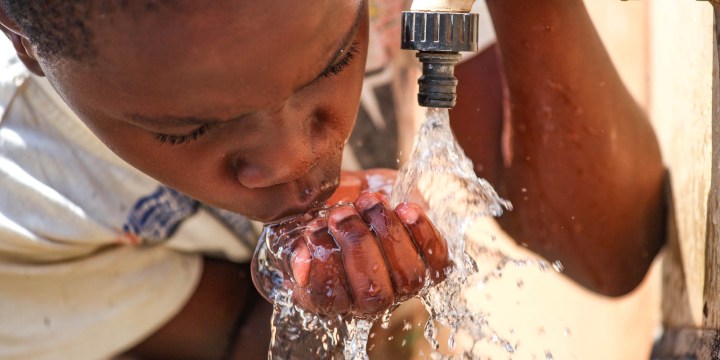
Rivers running red, an explosion of toxin-producing cyanobacteria and the possible emergence of multidrug-resistant pathogens are some of the potential consequences of South Africa’s polluted and stretched water systems.
South Africa has reached its absolute limit of finite water supply. The government should treat the water crisis as its single biggest priority, Professor Anthony Turton, a specialist in water resource management, said this week.
Turton spoke at the 20th Tipping Points online seminar, which convened under the theme “SA’s Water Whirlpool of Pain”, to ponder the state of the country’s water resources and offer solutions.
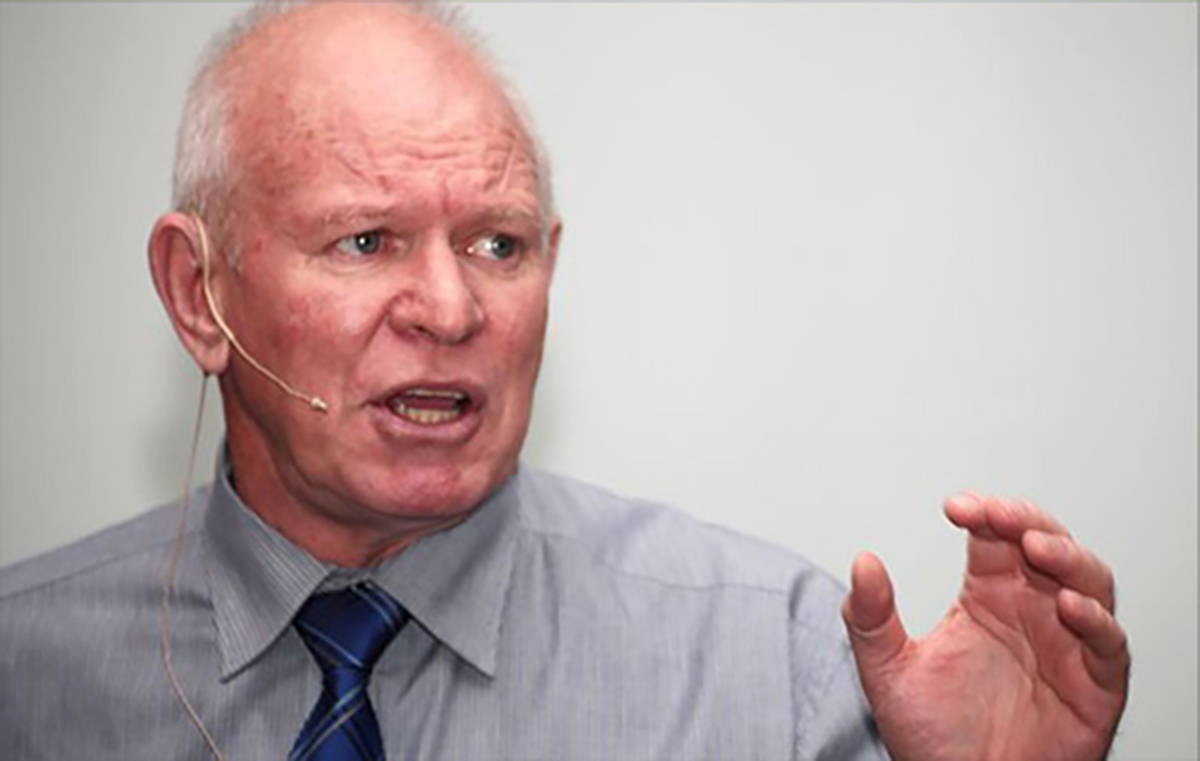
Water resource management specialist Prof Anthony Turton is deeply concerned about the parlous state of South Africa’s rivers, largely due to the malfunctioning, and in some cases, the complete collapse, of municipal wastewater treatment works. (Photo: Supplied)
Joining Turton, who facilitated the 20 March webinar, were panellists Professor Sylvester Mpandeli, an executive manager at the Water Research Commission; and Mariette Liefferink, an activist and chief executive of the Federation for a Sustainable Environment.
Flesh-eating bacteria
Turton and his colleagues detailed the parlous state of South Africa’s rivers, partly caused by the decline or collapse of municipal wastewater treatment works.
Inevitably, this water reached the sea, putting the health of people who live on the coast at risk.
“A lagoon is the terminal end of everything that happens upstream of it,” Turton said, “and it’s not inconceivable we’ll see the emergence of multidrug-resistant pathogens coming out of these places.”
Read more in Daily Maverick: Spraying of controversial herbicide on Vaal River water lettuce begins – critics urge caution
He explained that sewage pooling in lagoons contained human waste and pathogens alongside partially metabolised medications, such as antiretrovirals, antibiotics and spiked estrogen levels from birth control pills.
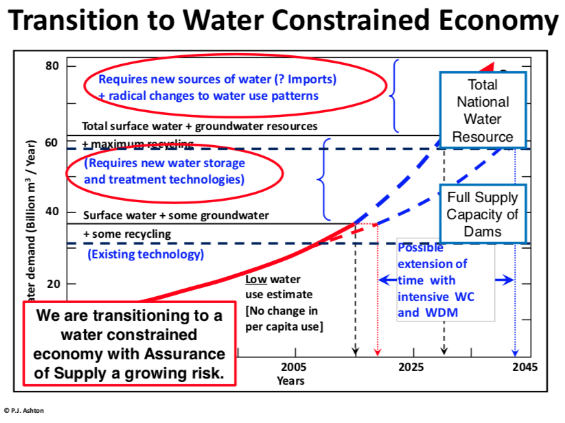
Already water-scarce, experts say South Africa is becoming drier — and dangerously hotter. Water demand has long outstripped supply, they say. South Africa is a decade behind in investing in technologies for recycling water and recovering it from waste, says University of the Free State Professor Dr Anthony Turton. (Graphic: Supplied)
“There have been eight to 10 cases I’m aware of where people have been in contact with certain bacteria in the river with an open wound,” he said, “and the bacteria have been flesh-eating bacteria.”
Liefferink described the state of wastewater treatment works as “dire and widespread” and spoke of a crisis facing SA’s water resources.
She cited the country’s water and sanitation master plan, which estimated a R333-billion shortfall in maintenance and investment in water infrastructure over the next 10 years, compounded by a lack of skilled water engineers. These factors would contribute to a projected water deficit of 17% by 2030.
Adding to South Africa’s water woes were recurrent droughts, climate variations and inequities in access to water and sanitation.
Liefferink quoted a United Nations special rapporteur on toxics and human rights who last year noted a “crude legacy of environmental racism … of water and chemical pollution” that still affected South Africa’s poor and would require structural, economic and legislative interventions to fix.
Acid mine water and a blooming problem
Mine acid water drainage was a big part of the problem.
“It is a known fact that acid mine water drainage is responsible for the most costly environmental and socioeconomic impacts — and it may continue for many years after mines are closed,” Liefferink said.
Turton told delegates that South Africa had perhaps the most eutrophic rivers in the world. Eutrophication happens when an overabundance of nutrients enters the water, typically from sewage, industrial waste and farming runoff and fertilisers. Algae feed on the nutrients, growing, spreading and turning the water green and blue. Algae blooms can smell bad, block sunlight and release toxins. Red algae were increasingly found as well, he explained.
“It’s not too inconceivable in the not-too-distant future that we’re going to see rivers turning red,” Turton said.
Red alert
A few species of algae are known for their ability to turn water red when present in high numbers. Among them is the microalgae Euglena sanguinea, blooms of which were found in Mpumalanga and Limpopo over the past few years and, more recently, in Hartbeespoort.
The species is toxic, causing fish to die off and inhibiting mammalian tissue growth. Blooms of another hazardous algae, Cylindrospermopsis raciborskii, were also becoming increasingly prevalent in South African freshwaters, especially in the lower reaches of the Orange River, Turton said. Its toxic effect on humans is unknown but it is another potent fish killer.
He said these species of algae were spreading quickly and had a comparative advantage over other dominant blue-green algae species. Changes to the alkalinity of aquatic systems brought about by mine water drainage may have been responsible.
“So, we’ve got a lot of issues coming out of there from a tipping-point perspective,” he said.
Faecal woes
Add into the mix seven billion litres of sewage getting discharged into rivers and dams in South Africa every day, and the country’s water quality crisis can only worsen.
Turton warned that unless urgently addressed, it was only a matter of time before these “severely degraded” water bodies had serious human health implications. He reminded delegates of the fatal outbreak of cholera north of Pretoria last year, which was “directly correlated to the management of sewage at a specific wastewater treatment plant”.
“Our water boards are burdened to the point of not being able to stay afloat in the not-too-distant future.”
Read more in Daily Maverick: SA faces serious human health risks if we continue discharging toxic sewage into waterways
Turton said the rate at which South African rivers changed had become “so rapid that I believe it will start exceeding our institutional capacity to cope”.
Liefferink agreed, noting that from 1999 to 2011, there had been a 500% increase in the degree to which the country’s main rivers were classified as being in a poor ecological condition, with some rivers pushed beyond the point of recovery.
“It’s not macrobiotically safe to drink the water in almost half (46%) of our drinking water systems,” Liefferink said, quoting from the Blue and Green Drop reports, which found that 64% of SA’s wastewater treatment systems were in poor or critical states and 47% of the water treated for municipal use went to waste or was not paid for.
How to turn it around
Mpandeli acknowledged that South Africa’s water sector faced many pressing problems, including the fact that SA is a dry country, the threat of climate change and the growing thirst for water from a population that had reached 60 million.
But he remained optimistic.
In reply to a question from the floor, he said: “The challenges could be addressed if we put our heads together.
“Various institutions are addressing water issues — if we have relevant technologies, skills and expertise we can overcome the challenges we are facing. We can find sustainable solutions, but we need to work together.”
Mpandeli, who has been working in the water and agriculture sectors for 24 years, said the Water Research Commission (WRC) had been striving to get government departments and organisations to work together, reminding them of the water-energy-food nexus.
The commission had been “trying to break the silo mentality among departments” and had come up with interesting recommendations for policymakers in the past 11 years. The research supported by the WRC looked not only at the biophysics of water but at socioeconomics too and there had been a move away from theory to practice, with projects that sought to demonstrate or trial technologies and decision-support tools, particularly in vulnerable communities.
Mpandeli said the WRC was supporting projects focusing on tackling alien and invasive plant species which threatened water catchment areas.
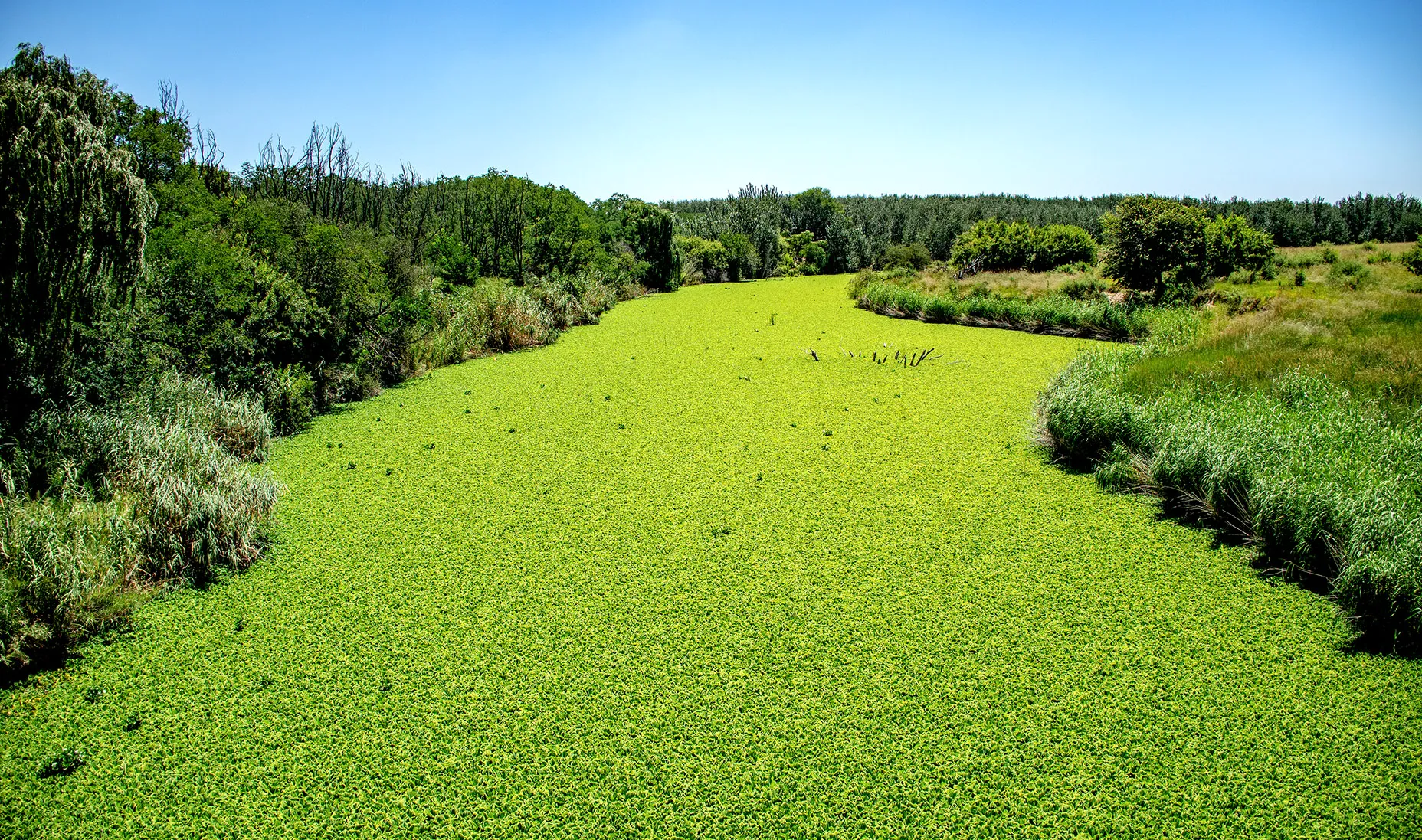
The Taaibosspruit (a tributary stream connected to the Vaal River) is inundated with alien invasive species, with water lettuce covering the stream for kilometres. (Photo: Julia Evans)
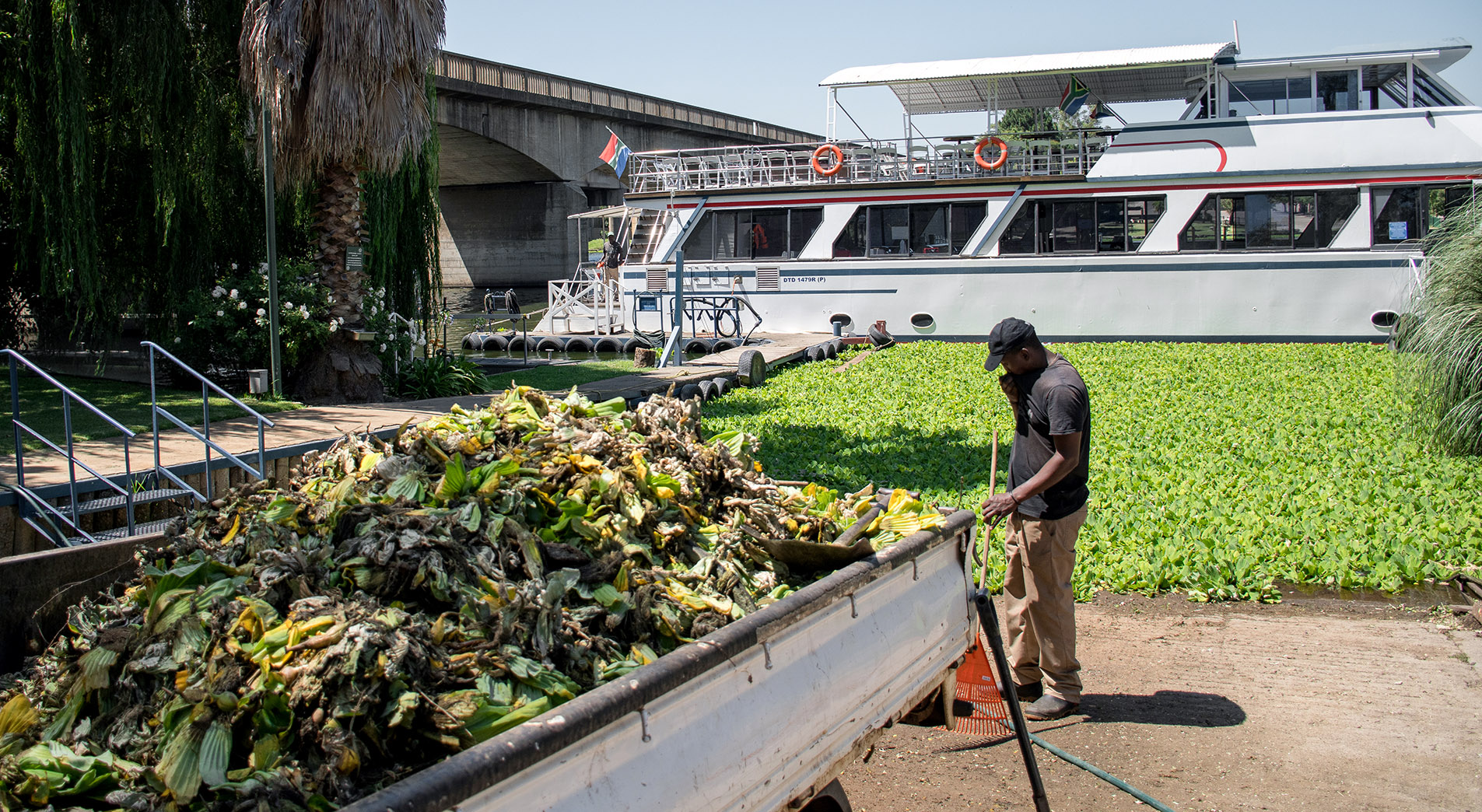
Residents along the Vaal River have been removing several tonnes of water lettuce from the river in an urgent attempt to stop the rapid growth of this invasive species. (Photo: Julia Evans)
“We are also looking at making sure some of the byproducts from alien invasive species are used by local communities. We believe this is a long-term initiative that the WRC is driving with partners to develop sustainable solutions. We are also training community members to clear alien and invasive species.”
He stressed the WRC’s mandate was to drive research and innovations, but through partnerships it was assisting with opportunities for job creation.
Policy and its limits
Liefferink outlined proposed amendments to legislation that would license water service providers and empower the Department of Water and Sanitation to revoke the licences of providers and water authorities for persistent non-compliance.
She spoke about the 2022 policy on mine water, which enshrined the polluter-pays principle and stressed the reuse of mine water. She discussed proposed amendments to the National Water Act, which include “aggressive restrictions to restore and protect ecological infrastructure”.
However, Liefferink noted, “South Africa is known to be very rich in policies and in strategies and in guidelines, but very poor in implementation.”
She spoke about the good work being done by private companies to assist the state, including mining companies helping to upgrade and maintain wastewater treatment works.
Quoting from the National Development Plan for 2030, Liefferink, who is perhaps best known for her work as an environmental activist, advised delegates that an active citizenry and social activism were necessary for democracy and development to flourish.
“…To raise the concerns of the voiceless and marginalised and hold government, business and all leaders in society accountable for their actions.” DM
Additional reporting: Matthew Hattingh and Fred Kockott|Roving Reporters. Savannah Burns is a freelance writer and correspondent for Roving Reporters.
This story was produced with support from Jive Media Africa — science communication partner of Oppenheimer Generations Research and Conservation.




















 Become an Insider
Become an Insider
All of us should be saving water too. I pass a nursery in Linden, where the fence high sprinklers are shooting out water in the midday heat! Boreholes can eventually dry up, so that’s no excuse to waste. Has there been any study of the impact of the rapid proliferation of boreholes in Johannesburg?
Impossible to talk about a lack of qualified water and sanitation engineers (civil engineers) without considering BEE as a factor – the rush to replace old experienced engineers of the wrong skin tone, with younger less experienced of the ‘right’ skin tone.
Surely the limiting of those eligible for employment by BEE should be suspended for such critical professions until our water and sanitation crises are resolved? Wouldn’t this be the smart thing to do?
Turton is wrong. We have plenty of water in SA. Go to any river mouth in the summer months and what do you see. – water rushing into the sea. I was at Augrabies falls early in the season and beheld the spectacle of the vast amount of water flowing over the falls and all of it going into the Atlantic at Orangemund. What we do have is a water MANAGEMENT problem – raw sewage running into our waterways, and thanks to ANC cadre deployment – we now have, as Mark Jackson notes, incompetents. They are overpaid and underworked not to mention corrupt and “with a collective IQ that could be counted on the fingers of one hand with digits to spare” , who have replaced the skilled engineers and technicians who could easily fix these things.
There’s zero discussion of the vast amounts of pristine water falling from the heavens that we could and should be harvesting and storing in private homes, schools, clinics. More than enough water in much of SA if only we could put our heads together.
Only 8% of rainwater reaches rivers and dams apparently. 92% is lost; a vast reservoir of water that we just aren’t utilising.